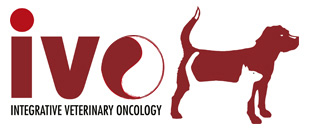

Nutrition is a very important, but often overlooked, component of cancer care in the veterinary patient. Cancer and its treatments may alter the body's ability to tolerate certain foods and use certain nutrients. Benefits to good nutrition include:
- Improved quality of life ("feeling" better)
- Improved strength and energy
- Maintenance of body weight
- Decreased treatment-related side effects
- Decreased risk of infection
- Improved ability to heal and recover from surgery and other therapies
Patients with cancer often have increased nutritional needs. For example, patients undergoing cancer surgery need extra calories and protein for wound healing and recovery. In addition, muscle wasting and weight loss ("cancer cachexia") can be a common symptom of cancer which can lead to decreased quality of life, poor response to treatment, and shortened survival time when compared to cancer patients without this syndrome.
Cancer has been shown in several studies to result in alterations in protein, fat, and carbohydrate metabolism. Carbohydrate metabolism results in the most dramatic metabolic alterations. One reason for this is that cancer uses simple carbohydrates preferentially as an energy source.
Thus, the "optimal" diet for the cancer patient is one that is lower in simple carbohydrates and higher in proteins and fats. It is ideal for the protein and fat sources to be of high quality (preferentially "human grade") and the diet free of preservatives. There are several commercial diets that we recommend based on the above criteria.
Commercial Dry Foods:
The best ratio of proteins to carbohydrates in a commercial diet for both dogs and cats is INNOVA EVO.
This diet contains 42% protein and 11.73% carbohydrates (dog) and 50% protein and 7% carbohydrates (cat).
Other High Protein Diets include:
- Solid Gold Barking at the Moon (44% protein; 20% carbs)
- Wellness CORE
- Blue Buffalo Wilderness
Look for foods that contain 30% or higher protein and 20% or lower carbohydrates (i.e. protein % higher than carbohydrate %).
Wellness SuperMix puppy maybe considered (28% proteins and 32.1 % carbohydrates) if supplemented with home cooking to
increase protein content.
For cats, no other commercial diet comes close to the ratio of proteins/carbohydrates as the Innova Evo.
These diets may be purchased at Goober Express, Pet Food Depot, or other feed stores or specialty pet stores.
Petco and Petsmart do not routinely carry these products at this time.
Home Cooking
To ensure a balanced diet, we recommend feeding of a base dry commercial diet as above. However, the diet may be supplemented
with proteins and vegetables. Poultry (chicken, turkey), fish (salmon, tuna, mackerel), and tofu are a good source of lean protein.
Vegetables may also be supplemented in the diet. Do not feed onions as these cause anemia in dogs and cats. A good rule of thumb is
the darker the color of the vegetable, the more nutritious it is. Because of altered immune function, raw meats and bones should not be
fed to cancer patients. Fruits and vegetables may be fed raw after being thoroughly washed.
Vitamins, Minerals, and Other Dietary Supplements
It is beneficial to feed your pet a multi-vitamin and mineral supplement daily.
Antioxidant vitamins may also be recommended for your pet during or after the course of therapy. It is recommended that patients undergoing radiation therapy delay starting anti-oxidant support until therapy is completed due to the concern of the vitamins interference with the cancer treatment. Although it has been debated whether anti-oxidant vitamins interfere with chemotherapy, we currently do not believe that supplementation during chemotherapy is harmful.
|
